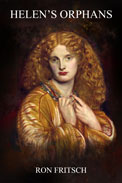
 |
In Greek mythology, the legendary Trojan War is universally recognized for the carnage it caused and the notion that it stemmed from ego-fueled ambitions of attaining Helen, anointed as the most beautiful woman in the world. With this tale as inspiration, Fritsch peels back the curtain even more and spins a complex web of secrets and revelations that keep the audience engaged throughout.
With the many subplots that run concurrently in the book, it's a treat to learn about Greek mythology from numerous perspectives, particularly those of Helen and Timon. The author tries to establish conclusively that Helen eloped with the Trojan Prince Paris or was abducted against her will. Whether it is Helen's attachment to her former orphanage in the book's present time, the heightened, one-sided sibling rivalry between Helen and Clytemnestra, or Agamemnon's fury toward being rejected by Helen, the plotlines are constantly moving forward toward an inevitable collision course.
Though in the Homerian universe, the outcome and intention of the main players in the Trojan War are clearly established, Fritsch's work seeks to paint a more comprehensive, alternative picture. For example, Paris's unquestionable admiration of the Greek culture and desire to participate in their Olympic games are intriguing. A blossoming friendship between Menelaus and Paris creates suspicion that the latter would betray his friend in that manner. Designed for even the most casual of readers, the work offers intimate details such as the slaughter of Hector and Paris's siblings and the lives of orphans like Lukas, who hold Helen directly responsible for their plight. Above all else, Fritsch succeeds in simplifying his narrative to target Helen's backstory as it pertains to the Trojan War and her role as Queen of Sparta. His ability to objectively examine alternative angles of a classical work is commendable.